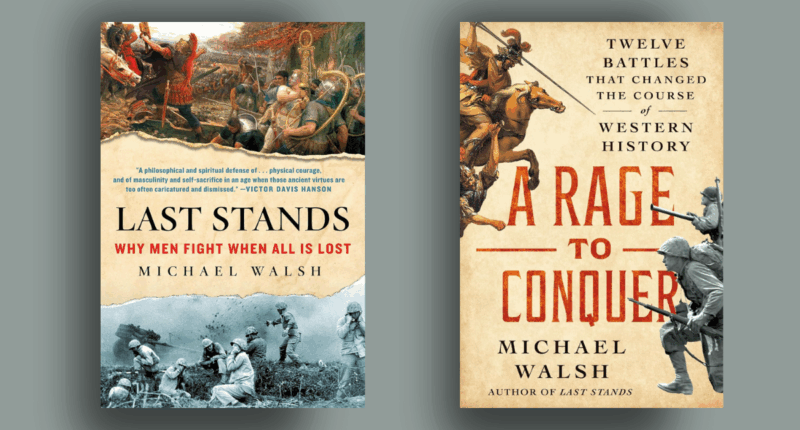Michael Walsh’s Last Stands: Why Men Fight When All is Lost and A Rage to Conquer: Twelve Battles That Changed the Course of Western History are not merely military histories; they are meditations on the human condition. Walsh writes not as a detached chronicler of tactics and campaigns but as a moral philosopher seeking to understand the inner world of the soldier and the spiritual anatomy of courage.
His subject is war, but his theme is man — his strength, his limits, his longing for greatness, and his willingness to confront annihilation for something greater than himself. Across these books, Walsh presents a compelling defense of martial virtue and manliness as essential to civilization, portraying war as both the crucible and the revelation of the human spirit.
The Necessity of War and Courage
Walsh begins both volumes with a premise that runs counter to modern sensibility: War is not an aberration of human nature but its expression. “War has been an essential part of the human condition as long as there has been a human condition,” he declares in A Rage to Conquer, insisting that it is “the principal agent of societal change” and “an important facet of every culture, from the highest civilization to the lowliest primitivism.” For Walsh, to speak of war is to speak of what is elemental in man — his will, his passion, and his search for meaning through struggle.
The modern world, he argues, has tried to deny this truth. Since the Second World War, “the political leadership of the United States” has forgotten that war, cruel though it may be, remains the ultimate test of policy and purpose. Against this forgetfulness, Walsh restores to war its tragic grandeur. He does not glorify bloodshed but insists that courage and sacrifice — those qualities that emerge only under fire — are inseparable from the creation and defense of civilization. The battlefield, in his telling, is the stage on which the virtues of courage, discipline, loyalty, and honor are proven and preserved. To reject that arena entirely is to risk the effeminization and decay of society itself.
In Last Stands, Walsh opens with a deeply personal meditation: His father, a Marine officer who fought in the Korean War, embodies the archetype of the soldier as a man. “He immediately took command and has never relinquished it — as no real man ever does, at least not willingly, and except by death,” Walsh writes. This personal inheritance becomes the foundation of his argument: War is not merely historical but existential, the ultimate arena in which the meaning of manhood is revealed. Through his father’s example, Walsh defines manliness as a compound of courage, endurance, and fidelity to duty — virtues that transcend the question of victory or defeat.
Valor in Defeat
Last Stands takes as its theme the paradoxical glory of defeat. From Thermopylae to Cannae, from the Alamo to the Chosin Reservoir, Walsh recounts battles in which men fought knowing they would not survive, yet whose courage ennobled their loss. His argument is not romanticism but realism. The highest expressions of virtue often arise not in triumph but in resistance to inevitable destruction.
In these desperate moments, Walsh sees the triumph of the human spirit over circumstance. He quotes the seventeenth-century Hungarian poet Miklós Zrínyi: “There is one hope for the defeated that he cannot hope in victory/Is it not better to die as a man than to live in shame before the eyes of all?” This sentiment captures Walsh’s central conviction — that man’s greatness lies in his capacity to choose honor over survival. Death, when embraced as the price of fidelity to one’s cause, becomes a form of transcendence.
Thermopylae stands as the archetype of this paradox. For Walsh, the three hundred Spartans’ resistance against the Persian invaders is not a myth of hopelessness but a revelation of human nobility. Their stand, though futile in immediate military terms, became an enduring moral victory. Likewise, at Cannae, Teutoburg Forest, and the Alamo, he sees men asserting through their defiance the truth that “to fight is to affirm meaning in a meaningless world.” The act of resistance becomes a sacrament of courage; it redeems the world from nihilism.
Walsh’s reflections recall the Homeric and classical traditions, in which death in battle was considered the ultimate expression of virtue. In A Rage to Conquer, He cites the Iliad, where warriors “groaning, clutching the bloody dust” nonetheless die with dignity, and Wilfred Owen’s bitter inversion of “Dulce et decorum est pro patria mori” to ask whether the old idea of dying for one’s country is really a lie. Walsh’s answer, implicit in every page, is no. It remains a truth for men who still believe in duty, faith, and honor. The soldier’s courage, he suggests, is the last defense of meaning in a relativistic age.
Courage as the Foundation of Virtue
For Walsh, courage is not a single virtue among others but the condition of all virtue. The man who cannot face death cannot be free, cannot love, cannot create. “To fight and die when there is no hope of victory,” he writes in Last Stands, “is to affirm one’s manhood in the face of annihilation.” In this view, courage is both physical and moral — the mastery of fear and the willingness to act rightly even when the cost is fatal.
In A Rage to Conquer, this theme expands into a philosophy of history. The great battles he recounts, such as Marathon, Gaugamela, Alesia, the Milvian Bridge, and Trafalgar, are not only turning points of power but revelations of human virtue. Each marks a moment when individuals and nations summoned the courage to act decisively in the face of uncertainty. For Walsh, war is a form of moral testing; the victors are those whose courage and clarity of purpose align with necessity. “A successful war accomplishes its objective,” he writes, whether that be survival, justice, or destiny. What determines that success is not technology or numbers but the human spirit — the willingness to endure and to conquer through will.
Thus, courage becomes the measure of civilization. A people who lose the will to fight for what they love, Walsh warns, will lose it altogether. “Pacifistic, nonviolent cultures rarely survive first contact with an outside enemy,” he observes. This is not cynicism but a recognition of the tragic structure of history: Peace is temporary, war recurrent, and only those who prepare to fight can preserve the goods of peace. Courage, therefore, is not a barbaric remnant but a civilizational necessity.
Manliness and the Question of Virtue
In A Rage to Conquer, Walsh insists that war is “by necessity and biology a masculine preserve.” This claim, provocative in contemporary discourse, is not an exclusion of women but an assertion of difference. For Walsh, the masculine virtues (courage, endurance, sacrifice, leadership) arise from man’s natural role as protector and defender. He contrasts this with the feminine virtues of nurture and preservation. Civilization depends on the complementarity of both, but when the masculine principle weakens, society loses the capacity for self-defense.
In Last Stands, Walsh argues that the crisis of modernity is, at root, a crisis of manliness. The feminization of the West, its obsession with safety, comfort, and moral relativism, has bred contempt for the martial virtues that built civilization. “The only culture that doesn’t defend itself is one bent on suicide,” he warns. Against this background, the warriors of history stand as rebukes to modern decadence. They remind us that courage, not sensitivity, is the foundation of moral strength.
Walsh’s conception of manliness echoes classical and Christian ideals. Like Aristotle, he sees courage as the mean between cowardice and recklessness, the virtue that orders all others toward the good. Like Augustine, he understands just war as an extension of moral duty, not its negation. And like the epic poets and tragedians, he recognizes that true manhood is inseparable from the acceptance of death. To be a man is to face the inevitability of suffering and still act with honor.
In his portraits of soldiers from Spartan hoplites to Roman legionaries to modern Marines, Walsh emphasizes restraint and discipline as much as ferocity. The warrior’s strength lies not in rage but in mastery of self. This control, this moral order within chaos, is what distinguishes courage from brutality. It is the same quality that animates the heroes of Homer and Shakespeare, men who, like Hamlet, understand that “rightly to be great is not to stir without great argument, but greatly to find quarrel in a straw when honor’s at the stake.” Manliness, in this sense, is not aggression but responsibility — the readiness to defend what is right, even unto death.
The Moral Vision of War
Walsh’s moral vision of war rests on an austere but ennobling anthropology. Human beings, he argues, are not meant for comfort but for striving. “The question was not whether you would die but how you would die, and whether it would be a good death, a noble death, a death that meant something,” he writes in A Rage to Conquer. Death, in this sense, completes life by giving it purpose. The soldier’s death, when embraced in fidelity to duty, becomes the highest expression of freedom.
This vision rejects the nihilism of modern warfare and the bureaucratic detachment of the “managerial” state. Walsh’s heroes are not technocrats of destruction but men of character, whose deeds arise from conviction rather than calculation. His admiration for figures such as Alexander, Caesar, and Napoleon lies not only in their conquests but also in their embodiment of the will to act and impose order upon chaos. Each, in his way, represents what is “great and powerful in man,” the capacity to unite thought and action, courage and intellect, destiny and choice.
Yet Walsh is not blind to the moral ambiguity of war. He acknowledges its cruelty, its waste, its futility. “War may be hell,” he concedes in A Rage to Conquer, “but it brings peace.” This paradox defines his tragic realism: Human greatness is inseparable from violence, and the same spirit that creates civilization also destroys it. Like Heraclitus, whom he often invokes, Walsh sees conflict as the father of all things. The test of virtue, then, is not to abolish struggle but to ennoble it — to make war serve justice rather than appetite.
The Triumph of the Human Spirit
The central theme uniting Last Stands and A Rage to Conquer is the triumph of the human spirit, as defined by the ability of men to rise above fear, weakness, and despair through courage and determination. Whether in victory or defeat, Walsh’s heroes embody a moral constancy that transcends circumstance. They fight not because they expect to win, but because not to fight would be to betray themselves and their civilization.
This triumph is visible not only in the great commanders but also in the anonymous soldiers whose courage sustains history. At Chosin Reservoir, surrounded and freezing, Walsh’s father and his men fought their way out against impossible odds. “He was standing up, in full winter gear, his rifle at the ready, leaning against an abutment, sound asleep,” Walsh recalls in Last Stands. That image of a man who has given everything, yet remains upright, captures the essence of what Walsh means by valor. It is endurance, steadfastness, and dignity in the face of exhaustion and death.
Such moments reveal what he calls in Last Stands “the celebration of masculinity,” not as dominance but as duty — “duty, honor, and country.” This triad, inherited from the martial traditions of the West, defines man’s highest calling, which is to stand firm when others fall, to fight when all is lost, to give meaning to suffering through sacrifice. In these acts, Walsh finds the proof that the human spirit cannot be extinguished, even in defeat.
War and the Question of the Good
Behind Walsh’s celebration of courage lies a deeper philosophical question: What is the good for which men fight and die? His answer is complex. At one level, the good is concrete — the defense of home, family, faith, and nation.
However, at another level, it is a metaphysical cause that fights for the affirmation of human dignity against the void. In choosing to fight, even in hopeless situations, men assert the moral order of the universe. Their courage testifies that there are things worse than death, including cowardice, dishonor, and submission to evil.
In this sense, Walsh’s vision aligns with the classical understanding of virtue as excellence (aretē), which is the fulfillment of man’s nature through action in accordance with reason and courage. War, for him, is not a celebration of violence but a test of that excellence.
The soldier’s courage mirrors the philosopher’s pursuit of truth. Both confront the unknown with steadfastness and faith. Thus, the battlefield becomes a moral theater where man’s highest and lowest potentials are revealed.
Modernity and the Crisis of Virtue
Walsh’s critique of modernity is sharp and uncompromising. The West, he argues, has forgotten the virtues that sustain freedom. Its men have grown soft, its ideals sentimental. “When every man is a petitioner, a lackey, or a slave, and every woman a whore, that country is finished,” he warns in Last Stands. This is not misogyny but moral alarm, warning that a civilization that despises its protectors and denies sexual difference has lost its grasp on reality. The collapse of courage precedes the collapse of culture.
Against this decline, Walsh offers the example of historical warriors as mirrors of what is still possible. They remind us that strength, discipline, and sacrifice are not relics but requirements of liberty. “Men fight for power, for love, for sex, for money, for wealth and possessions,” he writes in Last Stands, but beyond these drives lies the nobler motive, to fight for the sake of the good itself. That capacity for self-overcoming, for choosing duty over pleasure, defines what is excellent and powerful in man.
Across Last Stands and A Rage to Conquer, Michael Walsh presents a unified vision of the human spirit forged in war. He does not glorify violence but venerates courage as the highest form of moral clarity. In victory and in defeat alike, the brave man triumphs — not by escaping death, but by mastering it. “The fight is everything — even for an eggshell,” he writes in A Rage To Conquer, invoking Hamlet’s recognition that honor, not outcome, gives meaning to action.
For Walsh, the courage of warriors past is not a museum relic but a living inheritance. It calls modern men to reclaim their strength and their sense of purpose, to resist the anesthetizing comforts of peace, and to stand firm in defense of civilization. The triumph of the human spirit lies not in abolishing struggle but in facing it with dignity and resolve. As long as there are men who will fight for the good, even when all is lost, the flame of virtue, and of humanity itself, will not go out.
Clifford Angell Bates, Jr. is a political scientist specializing in the history of political philosophy, comparative politics, international relations, literature and politics, and American constitutional thought. Since 2002, he has been University Professor at the American Studies Center at Warsaw University and, since 2004, an Instructor in the MA Diplomacy and International Relations program at Norwich University; he holds a Ph.D. in Political Science from Northern Illinois University and is the author of Aristotle’s Best Regime (2003) and The Centrality of the Regime for Political Science (2016).









